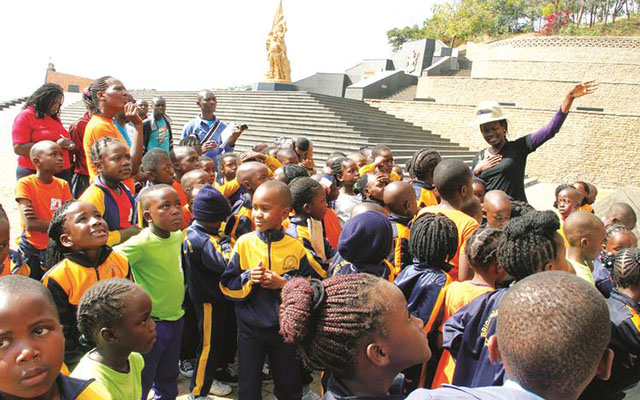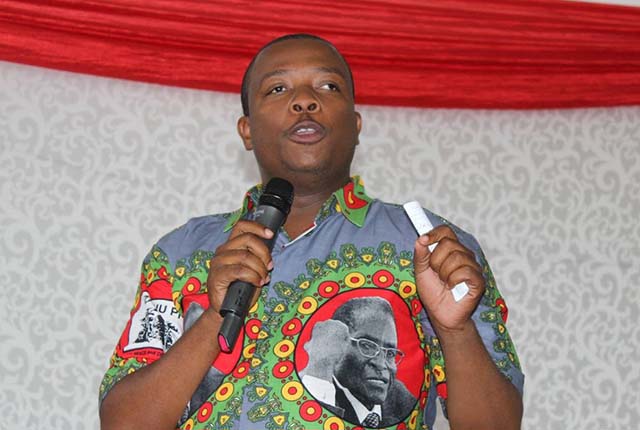Child marriages empty Mbire schools


Children from Bright Daisies Junior School yesterday went on an educational tour of the National Heroes Acre in Harare. The tour was organised by the school to mark the Day of the African Child which is commemorated on June 16 every year. The day was designated in 1991 by the African Union to promote children’s rights. – (Picture by Tawanda Mudimu)
Paidamoyo Chipunza and Abigail Mawonde
An average of 240 pupils have dropped from school since the beginning of the year in Mbire district, Mashonaland Central province, chiefly because of early child marriages.
The Ministry of Women Affairs, Gender and Community Development confirmed the statistics yesterday during a workshop on gender mainstreaming in Ruwa.
Deputy director for gender in the ministry Mr Stephen Nyaruwata said the district was reporting an average of 40 child marriages a month.
He said Makuvatsine Secondary School had the highest number of school dropouts.
The majority of them were from Wards 1, 2, 5 and 22.
These are near the Zambian border.
“Issues of gender mainstreaming are beyond power struggles between men and women. They have all to do with national development.
“Imagine just one district in Mashonaland Central Province has reported an average of 240 drop-outs since the beginning of the year. How many professionals have we lost there?” said Mr Nyaruwata.
He said Government was establishing gender committees across the country to help ensure gender equality.
This will ensure women get equal opportunities as their male counterparts.
These committees will work with gender focal persons to help intensify Government’s response.
Responding to questions from journalists during a press conference yesterday to mark the Day of the African Child set for today, Women and Law in Southern Africa national director Ms Slyvia Chirawu blamed child marriages on weak laws.
Ms Chirawu said there was need to quickly harmonise current laws with the national Constitution to protect young girls from abuse.
She said it was important to repeal laws that permitted child marriages.
Child marriages must also be criminalised under the Criminal Law Code.
Ms Chirawu urged the courts to severely punish offenders.
“The Customary Marriages Act (Chapter 5:07) has no age limit for marriage. The Marriage Act (Chapter 5:11) allows in Section 21, marriage of minors by written consent of their legal guardians. If the consent of the legal guardian(s) cannot be obtained for whatever reason, a judge of the High Court may grant consent to the marriage.
“The Marriage Act in Section 22(1) states that no boy aged below 18 and no girl aged below 16 may marry except with the written consent of the Minister of Justice, Legal and Parliamentary Affairs. This means that girls can marry at 16 years.”
Ms Chirawu added: “The Children’s Act (Chapter 5:06) defines a child as a person under the age of 16 and a young person as someone aged 16 but below 18. The same Act defines a legal guardian to mean also a husband of a girl who is under 18 years.
The Maintenance Act (Chapter 5:09) in Section 11 states that maintenance for a child shall cease when they marry meaning that the Act recognises child marriages.
Section 8 of the Matrimonial Causes Act states that a maintenance order in favour of a child shall cease when a child marries meaning that it recognises child marriages.
The Guardianship of Minors Act (Chapter 5:08) states that in Section 4(1)b that a parent who is granted sole guardianship shall also have power to consent to the marriage of a minor child.”
Ms Chirawu said the General Law Amendment Act (Chapter 8:07) in Section 15 (5) permits the operation of laws that grant majority status at an age earlier than 18.
She said this could be related to the Marriage Act, which states that once a girl gets married whilst still a minor, she automatically becomes a major and does not lose this status even if she divorces while still a minor.
Shamwari Yemwanasikana programme director Mr Chakanetsa Ruzvidzo attributed abuse of young girls to early sexual indulgence.
He said his organisation in partnership with the Women and Law in Southern Africa embarked on a two-year programme aimed at mobilising community action against child marriages.
According to the Women’s Coalition of Zimbabwe, the highest numbers of child marriages in Zimbabwe are from Mashonaland West which accounts for 42 percent of all child marriages in the country.
Mashonaland East follows at 36 percent and Harare 19 percent.
The Day of the African Child is commemorated every year on June 16.
It marks the 1976 student uprising in Soweto, South Africa, when students marched peacefully against poor education.
They were ruthlessly massacred by the apartheid regime.
This year’s celebrations are running under the theme, “The 2030 Agenda for Sustainable Development for Children in Africa: Accelerating protection, empowerment and equal opportunity”.







Comments